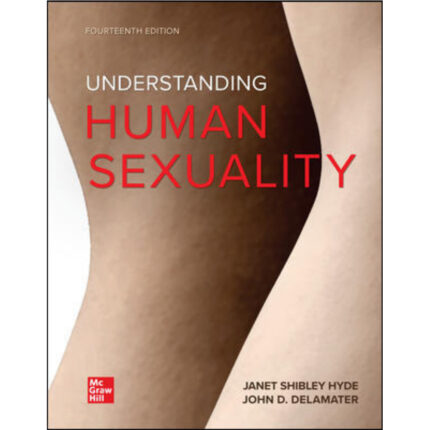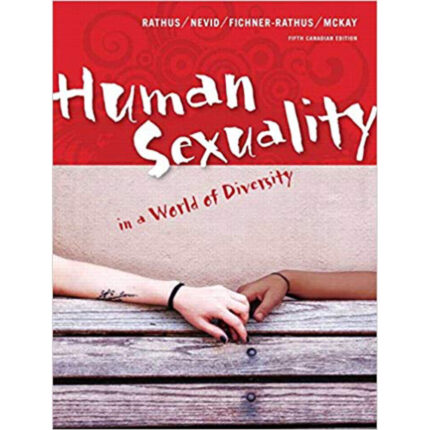Chapter 11: Sexuality through the Lifespan
11.1 Multiple Choice
1) Many boys experience their first erections __________.
- A) at birth.
- B) in the womb.
- C) at about 4 years old.
- D) between the ages of 6 and 8.
Answer: B
Page Ref: 344
Learning Objective: LO 11.1 Describe sexually related behaviors in infancy and early childhood.
Difficulty Level: Easy
Skill Level: Remember
2) Which is true regarding early childhood erections and vaginal lubrication?
- A) These responses indicate early sexual interest.
- B) These responses may be an expression of affection for adults.
- C) These responses are reflexes and do not necessarily indicate sexual interest.
- D) These responses indicate the beginnings of the phallic stage of development.
Answer: C
Page Ref: 344
Learning Objective: LO 11.1 Describe sexually related behaviors in infancy and early childhood.
Difficulty Level: Moderate
Skill Level: Understand
3) Infants often engage in pelvic thrusting __________.
- A) at 3 months old.
- B) at 8–10 months old.
- C) at 2 years old.
- D) never.
Answer: B
Page Ref: 345
Learning Objective: LO 11.1 Describe sexually related behaviors in infancy and early childhood.
Difficulty Level: Easy
Skill Level: Remember
4) In early childhood, sex educators typically advise that it is “normal” for children to __________.
- A) attempt intercourse during sex play.
- B) be curious about sexual anatomy.
- C) masturbate to orgasm.
- D) ask adults to look at their genitals.
Answer: B
Page Ref: 345
Learning Objective: LO 11.1 Describe sexually related behaviors in infancy and early childhood.
Difficulty Level: Difficult
Skill Level: Apply
5) Childhood sexual behaviors such as masturbation and “playing doctor” are __________.
- A) normal signs of curiosity.
- B) behaviors that have to be nipped in the bud to prevent future damage.
- C) signs that the child will grow up to be promiscuous.
- D) usually the result of children catching adults performing these behaviors.
Answer: A
Page Ref: 345
Learning Objective: LO 11.1 Describe sexually related behaviors in infancy and early childhood.
Difficulty Level: Difficult
Skill Level: Apply
6) Kinsey and his colleagues noted that baby girls show behaviors that resemble adult orgasm by as early as __________.
- A) in utero.
- B) 1 month.
- C) 4 months.
- D) 7 months.
Answer: C
Page Ref: 345
Learning Objective: LO 11.1 Describe sexually related behaviors in infancy and early childhood.
Difficulty Level: Easy
Skill Level: Remember
7) Which of the following is true regarding masturbation during early childhood?
- A) It is a sign of childhood sexual abuse.
- B) Masturbation by children is rare until about 2 years old.
- C) Masturbation before puberty is rare.
- D) Children may masturbate as early as 5 months old.
Answer: D
Page Ref: 345
Learning Objective: LO 11.1 Describe sexually related behaviors in infancy and early childhood.
Difficulty Level: Easy
Skill Level: Remember
8) Children in the United States typically do not engage in genital play with others until about the age of __________.
- A) two.
- B) four.
- C) six.
- D) eight.
Answer: A
Page Ref: 345
Learning Objective: LO 11.1 Describe sexually related behaviors in infancy and early childhood.
Difficulty Level: Easy
Skill Level: Remember
9) Given the available research, what is the most likely effect of allowing an infant to sleep in a parent’s bed?
- A) Co-sleeping with parents is likely to inhibit a child’s sexual functioning as an adult.
- B) Parents who attempt co-sleeping with their infants typically have emotional problems.
- C) Adults with emotional problems are more likely to report a history of co-sleeping during childhood.
- D) There do not appear to be any negative effects of co-sleeping.
Answer: D
Page Ref: 345-346
Learning Objective: LO 11.1 Describe sexually related behaviors in infancy and early childhood.
Difficulty Level: Difficult
Skill Level: Apply
10) Punishing a child for exploring their own genitals or masturbating may __________.
- A) increase the likelihood that the child will grow up to be a sexually responsible adult.
- B) destroy their chances for ever having a serious relationship in adulthood.
- C) make it more likely they will learn to feel guilty about sex in adulthood.
- D) help the child as an adolescent by making them more able to abstain from sex.
Answer: C
Page Ref: 346
Learning Objective: LO 11.1 Describe sexually related behaviors in infancy and early childhood.
Difficulty Level: Moderate
Skill Level: Understand













Reviews
There are no reviews yet.